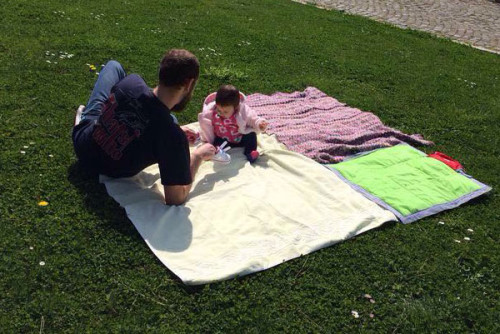I wanted you, dear readers, to try and imagine for a moment how much work is put into preparing an orchestra for a performance. It involves having a director of an orchestra, patience, musicians respecting the timing of one another, forging alliance, concentration, stress, freedom of making mistakes, corrections, listening to one another and most of all knowing the art of communication.
This is one way of comparing to communication between parents and their children. How parents should know, that communication is not a natural process, it is an art; therefore the capacity of communication is gained day by day, through the difficulties of making yourself understood and the painful experience in communication failure. Communication is what keeps us human beings alive, whether verbal or nonverbal. Human beings were not made to live their lives alone because fundamentally man is a sociable being. In fact, being communicative is a gift that we have been given to. We just need to learn how to make it a quality.
Life is made of interpersonal relationships; therefore we must learn how to choose an efficient way of communication, suitable for different situations.Learning how to interact with others is a very important experience and it is possible to learn how to communicate in order to be able to teach it to our children later on.The roots are in the family and it is within the family that we should learn.
Sometimes we feel we are living amongst people and not WITH people. Yes, just like when we tell our children “look, this is not a Hotel“. We are simply implying that a relationship which involves people living with one another practically means communion and participation. To begin teaching the art of communication we must first of all remember that we have a person in front of us, respecting our child, having faith in him, listening and trying to understand him, being careful about what we have to say or want to explain to him, always using an encouraging tone of voice and words because this is how we can gain his trust, to have him have faith in us and introducing him to communicate with us.
This precious experience can begin at a very early stage of a baby’s life when a mother is pregnant and she is carrying her baby in her womb. The baby too, in his own way, is making his mother aware of his presence by his first kicks, his constant movements. A mother instead could perhaps try to communicate with her baby by massaging her tommy or may be even singing or talking to her baby since he is already able to hear and feel her presence even at this early stage of his life.
After birth, of course, signs of communication change into crying, eye contact, sounds, words, hand gestures, simple ways of communication which later on in life turn into complex ones. The child is beginning to form his character; therefore it is of a great importance to identify what our child is trying to communicate to us. We often think of communication as something that is done exclusively verbally. As the matter of fact, it can also be non verbally, for example through our gestures, our tone of voice, our silence, our laughter, our hugs, our kisses, our visual expression,actually these signs are more significant than our words.
Words have great consequences when they are said to our child or our partner and can have either a negative or positive impact. Our words can be destructive or constructive and they also have the power of creating feelings of guilt, fear and abandon, in those whom we say them to. Using speaking as a form of communication, sharing and exchanging ideas is a positive way of entering in contact with the other person and allowing the other person into your world; you allow the relationship to grow in size, quality and in number of people.
We cannot exempt ourselves from a community because isolation will violently stop us from gaining experience.
How often do we hear people referring to their child or partnerwith things like:
‘You are such a disaster’ or ‘you are stupid’ or ‘you are always the same and never grow up’.
Or even pronouncing a painful sentence such as: I wished I didn’t have kids.
I can assure you very often parents refer to their children in such ways.
What kind of words are we using?
What message are we trying to give to the person and really what are we aiming at, using this type of communication?
These are words that can only destroy our child, making him feel empty and useless, or anyone else for that matter.
When we are parents we are not entitled to say anything we want to our child or partner.
Instead which are the words that can help our child to gain self-esteem and self-confidence?
Things like:
‘I love you’, ’you are special for me’, ‘be courageous you can make it’, ‘I believe in you’ or ‘you have my full support’.
Of course there are times when we know deep down that we have said something and have hurt the other person’s feelings. In that case we need to be courageous and say “sorry” and talk things over.
We should not leave things unsettled for too long since as human beings we hold grudges, pile anger and then in the most inopportune moment we explode due to frustration of how we were hurt.
When we realize that our child has done something for which he needs to be told off, it is his right to understand where he made the mistake and also to be given the time to correct himself. He can understand these steps only if we face him with humbleness and forgiveness. He needs to know we are not there to criticize him but to build up WITH him. We can help him to recover through five elements of encouragements. One way for example could be, when there has been a moment of tension and misunderstanding, by calming ourselves down and going towards him and hugging him, making him feel your love. I mean a real hug, the one that relaxes the muscles and makes him feel alive. Perhaps confronting him saying “I think I did not understand you and I wish to say sorry for how I reacted”. We would be opening a road to communication and also teaching him that it is never too late to talk things over.
Another way of encouragement, especially with younger children is through playing. This is a very efficient way of observing your child’s potentialities. You are communicating with him and allowing his emotions to come out; infact in schools teachers often propose theatrical lessons to students knowing it is a fabulous way of gaining courage and discoveries about their talents.
Another rewarding way is through drawing. You can really learn a lot about your child’s state of mind, his anger, jealousy, loneliness, difficulties in adapting and feeling insecure. Of course not always we have enough time to dedicate to our child but if we were to invest some time today when our child is still young and easier to teach and understand, we will have better results tomorrow when he will be an adolescent, when he will have formed a character which would be more difficult to modify later in life.
Another way is also by showing your child that you love him through those very simple ways. We take it for granted that our children should know that we love them. Not really, no one is really sure that we love them and how much we do. We need to discover the best way of telling our child that we care about him. It could be through a message, telling him verbally or a gift accompanied by a note. There are so many different ways of communicating our love for him.
Last but not least is laughter which is the best therapy for all of us. We are not laughing enough these days, we are too serious and take life extremely seriously and this does not help our communication. We should remind ourselves to laugh, smile and to be happier more often, things that scientifically have been proved which help our blood circulation, our soul,our moods, our energy and most of all would free our mind from unnecessary thoughts. Actually we would get fewer wrinkles too. We need to face life with positivity.
In communication it is very important considering few facts. For example the type of message we want to give, whom it is addressed to, which method we are using to send the message out and whom we are sending the message to. Neglecting and not being able to communicate properly we risk in being uncommunicative. Wanting to say one thing but meaning totally another thing, this too can be the cause of pushing communication away; therefore it is important to be efficient and clear.
Of course we must remember that parents should themselves, before anything, be in a peaceful, harmonious and respectable relationship with their partner to then be an example for their children, an example that makes communication easier and more successful. Not forgetting that women and men are biologically different to one another, therefore they think and behave in a different way. This means, if our partner has a different timing to us it is normal and if our partner deals with the same situation in a different way to us, it is again normal. This applies to our children too. So if our son behaves differently to our daughter it is normal and we should accept it and allowing them the freedom to be the way they want to be. This way we shall build a bridge which will connect us to them and allow us to communicate safely.
A THOUGHT
THERE IS NO EDUCATION WITHOUT COMMUNICATION.







